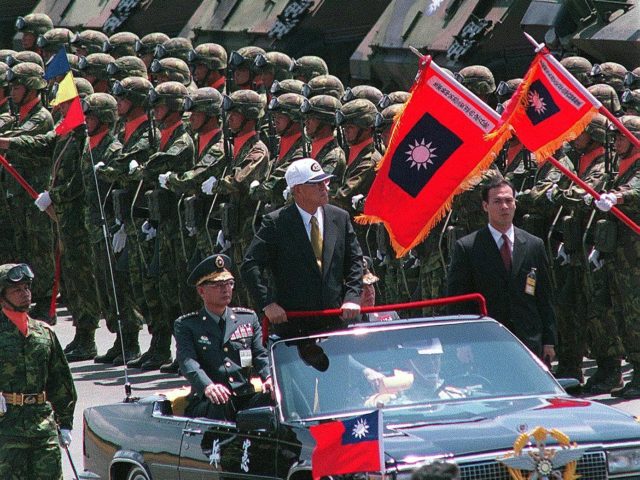China’s state propaganda outlet Global Times published two obituaries for Taiwan’s first democratically elected president, Lee Teng-hui, following his death Thursday disparaging him as a “national sinner” and declaring his death “not a sad news [sic].”
The Global Times articles also asserted that the “traitor” Lee would not be “remembered fondly” by Chinese communists, as he had elevated the status of Taiwan from fledgling political experiment to bonafide state independent of China.
Lee died on Thursday at age 97 of an unspecified illness. His tenure as president lasted from 1988 to 2000, but he became the nation’s first democratically elected leader in 1996 and dedicated his life’s work to promoting Taiwanese identity as distinct from Chinese Communist Party identity and pushing for a “two-state” solution to China’s false imposition of sovereignty over the island. No government in Beijing has ever ruled Taiwan.
As a dedicated Communist Party outlet, the Global Times depicted Lee’s promotion of love of country in Taiwan as an embarrassing aberration for the Chinese people, referring to him as the “godfather of Taiwan secessionism.”
“He had a chance to be a ‘great man, but eventually became a national sinner,'” the subtitle of one of the three obituary pieces published in the newspaper in English read.
“Lee’s death is definitely not a sad news to most people in the Chinese mainland as Taiwan pro-reunification politicians and mainland experts said he is “a traitor and a sinner of the Chinese nation,” the article read. The Communist Party uses the term “mainland” to refer to the parts of China that are actually legally in China, as opposed to its many illegal territorial claims throughout Asia.
“Lee was seen as a ‘sinner of the Chinese nation,'” according to one of the Global Times‘ typical “expert” commentators, identified as “Yang Lixian.” Yang added that Lee was “brainwashed by Japanese invaders when Japan occupied the island.
Lee is a typical traitor of the Chinese nation, who hid among the KMT and cheated his leaders to gain power in the 1980s.”
The article later claims as evidence of his “Japanese” brainwashing that Lee opposed China’s illegal territorial claim to the Senkaku Islands, a Japanese territory in the East China Sea.
The article adds that “netizens,” the word the Global Times uses for Communist Party propagandists on social media, lamented Lee’s death without having sufficiently suffered for “treason.”
Another obituary published on Friday claimed that Lee’s death was an opportunity for the United States and the sovereign Taiwanese government to “capitalize” by promoting democracy around the world – a goal presented negatively.
“Without Lee’s support, the separatist sentiment of Taiwan and the DPP would not have become as powerful as it is today,” another “expert,” Chang Ya-chung, observed – a relatively objective statement the Global Times presented as one of Lee’s faults, not an achievement.
That article also noted the dry statement from China’s Foreign Ministry on Lee’s death, disparaging Lee’s life work.
“We have taken note of the statement. Taiwan secessionism is a dead end, and the reunification and national rejuvenation of China is the trend of history, which is unstoppable to any individual or force,” spokesman Wang Wenbin told reporters. “We urge the relevant countries to uphold the one-China principle, to cautiously handle the matters about Taiwan, and not to send wrong information to Taiwan separatist forces.”
The “one-China principle” is the formal name for Beijing’s insistence that Taiwan does not exist.
Apparently not content with the severity of the posthumous attacks on Lee in his newspaper, the editor-in-chief of the Global Times, Hu Xijing, wrote his own obituary, titled, “Lee Teng-hui Will Not Be Remembered Fondly in Chinese History.”
“Taiwan democracy is not pure; It has been tainted with ‘Taiwan independence’ in recent years. Lee tampered with democracy from the beginning,” Hu wrote. “Lee is undoubtedly a sinner in the eyes of the Chinese nation. The sharp turn he initiated in Taiwan politics has greatly increased resistance to China’s rise and brought long-term strategic risks to Taiwan.”
“Lee led Taiwan to a dead end. His name will live in infamy in the Chinese history as he stood against the Chinese people in their goal of national reunification,” Hu concluded, asserting that Taiwanese history “will never exist independent of Chinese history.”
In contrast to the Communist Party’s judgment of him, the international community took the opportunity of his passing to applaud Lee’s work as a democratic leader.
“His contribution to Taiwan’s democratic development was an exceptional achievement. Today, Taiwan is a vibrant and prosperous democracy with a rich cultural heritage,” the Dalai Lama, the supreme authority of Tibetan Buddhism, said in a statement on Thursday. “Perhaps the best tribute we can pay him is to remember his courage and determination and emulate his dedication to democracy.”
“As Taiwan’s first democratically elected president, Lee helped put an end to decades of authoritarianism and ushered in a new era of economic prosperity, openness, and rule of law,” U.S. Secretary of State Mike Pompeo said. “During his 12-year tenure, Lee’s bold reforms played a crucial role in transforming Taiwan into the beacon of democracy we see today. He cemented the deep friendship between the United States and Taiwan.”
“President Lee is someone who had contributed significantly to Japan-Taiwan friendly relations,” Japanese Prime Minister Abe Shinzo said in response to the news of his death. “President Lee had a special sentimental connection to Japan. He brought freedom, democracy, human rights and other universal values to Taiwan, and laid the foundation for Japan-Taiwan relations.”
The current president of Taiwan, Tsai Ing-wen, lamented Thursday as a “day of mourning for me & all Taiwanese.”
“He laid the foundation for a democracy built on pride & our own identity, & his legacy will guide generations of Taiwanese to face the challenges ahead with courage,” she wrote.

COMMENTS
Please let us know if you're having issues with commenting.